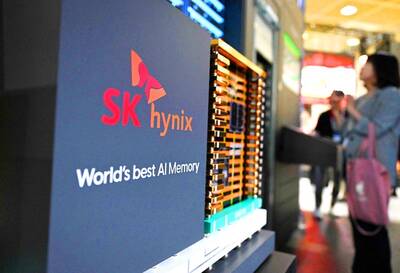CONGLOMERATES
Samsung taps Lee daughter
The second daughter of Samsung chairman Lee Kun-hee has been made a president at the firm’s de facto holding company, cementing his family’s hold on the South Korean giant. Lee Seo-hyun will lead management planning at the Everland’s fashion business, Samsung said in a statement yesterday. The 40-year-old was previously vice president of Cheil Industries, which was the former fashion unit before it handed over operations to Everland. Her older sister — Lee Boo-jin — has been a president at Everland since 2010, overseeing business strategy, while their only brother, Lee Jae-yong, was made vice chairman of Samsung Electronics last year. Lee Kun-hee is chairman of the group’s flagship unit Samsung Electronics and de facto leader of the entire business empire.
SOUTH KOREA
Inflation within target
South Korea’s inflation rose slightly last month, but stayed well below the central bank’s inflation target, state data showed yesterday. The consumer price index rose 0.9 percent year-on-year last month, up from a 0.7 percent gain in October, Statistics Korea said. The latest reading — well below the Bank of Korea’s target range of 2.5 to 3.5 percent — also marked the third straight month that the country’s inflation remained below 1 percent. Core inflation — which excludes volatile oil and food prices — rose 1.8 percent from a year ago, up from October’s 1.6 percent gain.
ELECTRICITY
Malaysia okays power hike
Malaysia will allow national power distributor Tenaga Nasional Bhd to raise electricity charges for the first time in more than two years, adding to business and living costs as the government cuts state subsidies. Tenaga will increase prices by an average of about 15 percent in Peninsular Malaysia to 38.53 sen (US$0.12) per kilowatt hour from Jan. 1, Malaysian Minister of Energy, Green Technology and Water Maximus Johnity Ongkili told reports in Kuala Lumpur yesterday. Tariffs will rise by an average 16.9 percent to 34.52 sen/kWh in the eastern state of Sabah, he said.
PHARMACEUTICALS
Thalidomide suit settled
A class action suit by Australian and New Zealand victims of Thalidomide against the anti-morning sickness drug’s British distributor Diageo Scotland Ltd has been settled for A$89 million (US$81 million), a lawyer said yesterday. The victims’ lawyer, Peter Gordon, told the Victoria state Supreme Court that the settlement, which is subject to court approval, brought to an end a long battle for compensation. A suit against the drug’s German manufacturer, Grunenthal Group, will be discontinued. More than 100 Thalidomide victims in Australia and New Zealand will receive compensation once the settlement has been ratified by the court in February, Gordon said.
GAMING
Cantor ventures into China
Cantor Gaming is the latest Las Vegas-based gambling company to move into the Chinese market. The sports betting and mobile gambling company announced this week that it would help operate a lottery club in Tianjin, along with partners Global Entertainment Investment & Management Co and the Tianjin Welfare Lottery club. Cantor will provide infrastructure and technological know-how, and will allow the club to offer wireless wagering, as opposed to paper-based betting. Cantor is advertising the new 7,400m2 club as a stylish place with mahjong parlors, private dining rooms and lounges, as well as lottery games.

Intel Corp chief executive officer Lip-Bu Tan (陳立武) is expected to meet with Taiwanese suppliers next month in conjunction with the opening of the Computex Taipei trade show, supply chain sources said on Monday. The visit, the first for Tan to Taiwan since assuming his new post last month, would be aimed at enhancing Intel’s ties with suppliers in Taiwan as he attempts to help turn around the struggling US chipmaker, the sources said. Tan is to hold a banquet to celebrate Intel’s 40-year presence in Taiwan before Computex opens on May 20 and invite dozens of Taiwanese suppliers to exchange views

Application-specific integrated circuit designer Faraday Technology Corp (智原) yesterday said that although revenue this quarter would decline 30 percent from last quarter, it retained its full-year forecast of revenue growth of 100 percent. The company attributed the quarterly drop to a slowdown in customers’ production of chips using Faraday’s advanced packaging technology. The company is still confident about its revenue growth this year, given its strong “design-win” — or the projects it won to help customers design their chips, Faraday president Steve Wang (王國雍) told an online earnings conference. “The design-win this year is better than we expected. We believe we will win

Power supply and electronic components maker Delta Electronics Inc (台達電) yesterday said it plans to ship its new 1 megawatt charging systems for electric trucks and buses in the first half of next year at the earliest. The new charging piles, which deliver up to 1 megawatt of charging power, are designed for heavy-duty electric vehicles, and support a maximum current of 1,500 amperes and output of 1,250 volts, Delta said in a news release. “If everything goes smoothly, we could begin shipping those new charging systems as early as in the first half of next year,” a company official said. The new

SK Hynix Inc warned of increased volatility in the second half of this year despite resilient demand for artificial intelligence (AI) memory chips from big tech providers, reflecting the uncertainty surrounding US tariffs. The company reported a better-than-projected 158 percent jump in March-quarter operating income, propelled in part by stockpiling ahead of US President Donald Trump’s tariffs. SK Hynix stuck with a forecast for a doubling in demand for the high-bandwidth memory (HBM) essential to Nvidia Corp’s AI accelerators, which in turn drive giant data centers built by the likes of Microsoft Corp and Amazon.com Inc. That SK Hynix is maintaining its